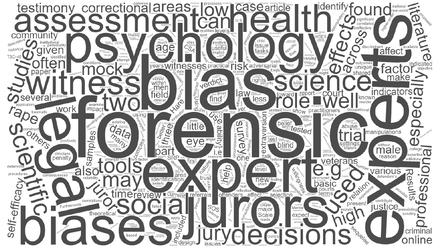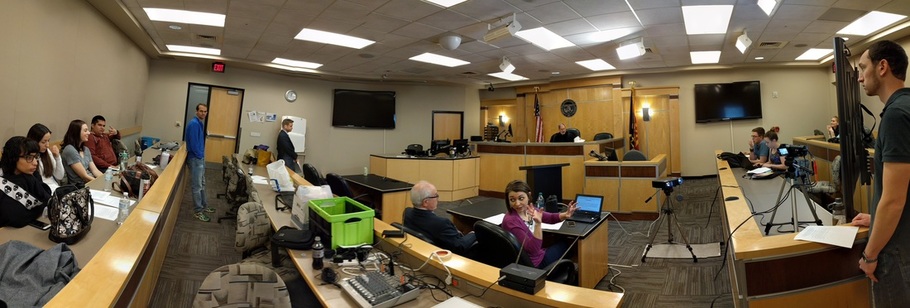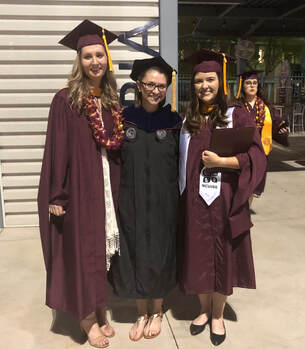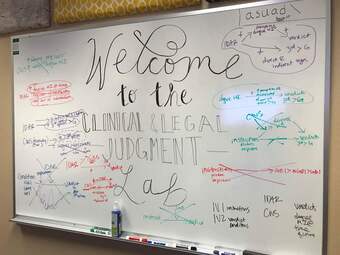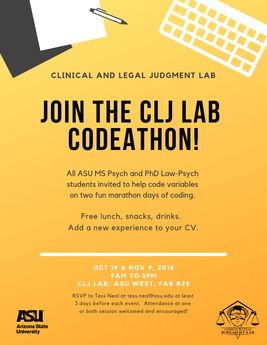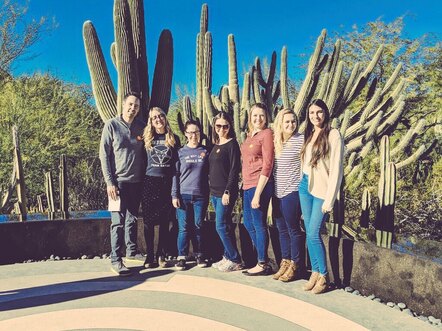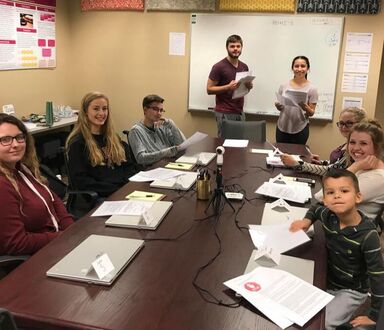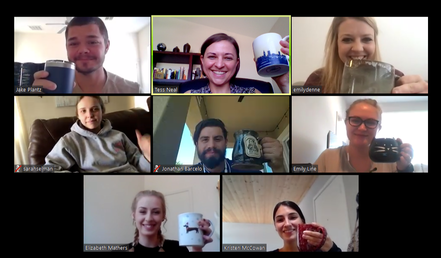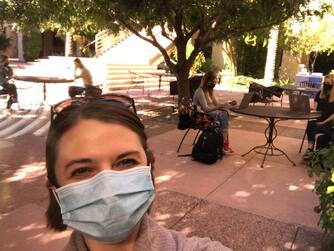What We Study
|
The central theme motivating our research is the desire to understand the way people think and reach decisions, as well as how to improve these processes to result in better outcomes for society. We are especially interested in human judgment processes as they intersect with the law. We approach these questions with different methods, such as descriptive studies that yield foundational information about phenomena that precedes explanatory experimental work, experimental methods that can yield causal inferences, and integrative syntheses across methods and sources. We study rich, real-world behaviors, embrace open science practices, and weave together theories and methods from the clinical, social, and cognitive traditions of psychological science.
Our work on these topics is organized by three overlapping categories:
|
All of our articles are available for free through PsyArXiv or ASU's Digital Repository
A lot of our data, code, and preregistrations are available on the Open Science Framework (a work in progress!) |
Selected Grants
PI Tess Neal, Co-PI Pamela "Nicky" Sandberg. Law and Society Association. Amount: $14,000. "How to Consult with the Law: Courts
Need your Expertise" Active dates 03/2023 - 06/2023
PI Tess Neal, Co-PI Emily Pronin (Princeton). National Science Foundation (#SES-LSS-1655011). Amount: $279,280.
"Expert Bias: Perceptions, Misperceptions, and Their Implications." Active dates: 05/2017 - 04/2023
Research Experiences for Undergraduates Supplement (#1917576), $15,000, active 02/2019-04/2023
PI Tess Neal, PI Sarah Gervais (University of NE-Lincoln). National Science Foundation (#SES-LSS-1733957). Amount: $272,287. "Calibration in Court: Jurors' Use of Scientific Information." Active dates 09/2017-08/2020
Research Experiences for Undergraduates Supplement (#1841975), $14,772, active 09/2018-09/2020.
PI Tess Neal. American Psychology-Law Society, Society for the Psychological Study of Social Issues, and ASU.
Amount: $8,850. "An Experimental Study of Bias in Psychologists' Diagnostic Reasoning." Active dates 11/2016 - 11/2017
Co-PI Tess Neal, PI Brian Bornstein (Univ. of NE-Lincoln). National Science Foundation (#SES-LSS-1353980).
"Institutional Trust and Confidence Workshop." Amount: $47,343. Active dates 01/2014 - 01/2015
Co-PI Tess Neal, PI Stanley Brodsky. National Science Foundation (Doctoral Dissertation Research Improvement Grant).
(#SES-LSS-1022849). "The Objectivity Demand: Experiences and Behaviors of Psychologists in Capital Case Evaluations."
Amount: $14,997. Active dates 08/2010 - 08/2011.
Need your Expertise" Active dates 03/2023 - 06/2023
PI Tess Neal, Co-PI Emily Pronin (Princeton). National Science Foundation (#SES-LSS-1655011). Amount: $279,280.
"Expert Bias: Perceptions, Misperceptions, and Their Implications." Active dates: 05/2017 - 04/2023
Research Experiences for Undergraduates Supplement (#1917576), $15,000, active 02/2019-04/2023
PI Tess Neal, PI Sarah Gervais (University of NE-Lincoln). National Science Foundation (#SES-LSS-1733957). Amount: $272,287. "Calibration in Court: Jurors' Use of Scientific Information." Active dates 09/2017-08/2020
Research Experiences for Undergraduates Supplement (#1841975), $14,772, active 09/2018-09/2020.
PI Tess Neal. American Psychology-Law Society, Society for the Psychological Study of Social Issues, and ASU.
Amount: $8,850. "An Experimental Study of Bias in Psychologists' Diagnostic Reasoning." Active dates 11/2016 - 11/2017
Co-PI Tess Neal, PI Brian Bornstein (Univ. of NE-Lincoln). National Science Foundation (#SES-LSS-1353980).
"Institutional Trust and Confidence Workshop." Amount: $47,343. Active dates 01/2014 - 01/2015
Co-PI Tess Neal, PI Stanley Brodsky. National Science Foundation (Doctoral Dissertation Research Improvement Grant).
(#SES-LSS-1022849). "The Objectivity Demand: Experiences and Behaviors of Psychologists in Capital Case Evaluations."
Amount: $14,997. Active dates 08/2010 - 08/2011.
Selected Publications
|
Expert Judgment |
In much of our work, we are interested in expert judgment especially as it intersects with the law, such as identifying systematic bias in how forensic psychologists and forensic scientists reach conclusions about cases, problems in how judges make decisions about evidence admissibility, unjust influences on prosecutor's judgments about whether to file charges, and understanding how policymakers rely on evidence to create policy. Examples include:
|
Line, E.N. & Neal, T.M.S. (in preparation). Experts screening experts: An experimental approach to understanding courts' abilities to effectively gatekeep psychological assessment evidence.
Martire, K.A., Neal, T.M.S., Gobet, F., Edmond, G., & Chin, J. (commissioned). Judging experts: Psychological insights for evaluating expertise. Nature Reviews Psychology.
Neal, T.M.S., MacLean, N., Morgan, R.D., & Murrie, D.C. (revise & resubmit). Psychologists’ diagnostic reasoning can be susceptible to well-understood cognitive biases.
Neal, T.M.S., Lienert, P., Denne, E., & Singh, J.P. (2022). A general model of cognitive bias in human judgment and systematic review specific to forensic mental health. Law and Human Behavior, 46(2), 99–120. https://doi.org/10.1037/lhb0000482.
Twitter thread here.
MacNeil, E. R., Cox, J., Daquin, J. C., & Neal, T. M. S. (online first). Gender Role Attitudes and Prosecutorial Decision-Making in a Case of Intimate Partner Violence. Journal of Interpersonal Violence, 0(0). https://doi.org/10.1177/08862605231207901
Cox, J., Daquin, J.C., & Neal, T.M.S. (2022). Discretionary prosecutorial decision making: Gender, sexual orientation, and bias in intimate partner violence. Criminal Justice and Behavior,49(11), 1699-1719. https://doi.org/10.1177/00938548221106498
Neal, T.M.S., Saks, M.J., Geisinger, K., Slobogin, C. & Faigman, D. (2019). Psychological assessments in legal contexts: Are courts keeping “junk science” out of the courtroom? Psychological Science in the Public Interest, 20(3), 135-164. doi: 10.1177/1529100619888860.
MacLean, N., Neal, T.M.S., Morgan, R.D., & Murrie, D.C. (2019). Forensic clinicians’ understanding of bias. Psychology, Public Policy, and Law, 25(4), 323-330. doi: 10.1037/law0000212.
Neal, T.M.S., Hight, M., Howatt, B.C., & Hamza, C. (2018). The cognitive and social psychological bases of bias in forensic mental health judgments. In M.K. Miller & B.H. Bornstein (Eds), Advances in Psychology and Law: Volume 3 (151-176). New York: Springer.
Neal, T.M.S. (2018). Discerning bias in forensic psychological reports in insanity cases. Behavioral Sciences & the Law, 36, 325-338. doi: 10.1002/bsl.2346
Neal, T.M.S. & Cramer, R.J. (2017). Moral disengagement in legal judgments. Journal of Empirical Legal Studies, 14, 745-761. doi: 10.1111/jels.12163
Neal, T.M.S. (2016). Are forensic experts already biased before adversarial legal parties hire them? PLOS ONE., 11, e0154434. doi:10.1371/ journal.pone.0154434
Neal, T.M.S. & Brodsky, S.L. (2016). Forensic psychologists’ perceptions of bias and potential correction strategies in forensic mental health evaluations. Psychology, Public Policy, and Law, 22, 58-76. doi: 10.1037/law0000077.
Neal, T.M.S. & Grisso, T. (2014). Assessment practices and expert judgment methods in forensic psychology and psychiatry: An International Snapshot. Criminal Justice & Behavior, 41, 1406-1421. doi:10.1177/0093854814548449.
Neal, T.M.S. & Grisso, T. (2014). The cognitive underpinnings of bias in forensic mental health evaluations. Psychology, Public Policy, & Law, 20, 200-211. doi:10.1037/a0035824
Neal, T.M.S. & Brodsky, S.L. (2014). Occupational socialization’s role in forensic psychologists’ objectivity. Journal of Forensic Psychology Practice, 14, 24-44. doi: 10.1080/15228932.2013.863054
Kelly, J.O., Brodsky, S.L., Neal, T.M.S., & Cramer, R.J. (2011). Prosecutor pre-trial attitudes and plea-bargain behavior toward veterans with Posttraumatic Stress Disorder. Psychological Services, 8, 319-331. doi: 10.1037/a0025330
Martire, K.A., Neal, T.M.S., Gobet, F., Edmond, G., & Chin, J. (commissioned). Judging experts: Psychological insights for evaluating expertise. Nature Reviews Psychology.
Neal, T.M.S., MacLean, N., Morgan, R.D., & Murrie, D.C. (revise & resubmit). Psychologists’ diagnostic reasoning can be susceptible to well-understood cognitive biases.
Neal, T.M.S., Lienert, P., Denne, E., & Singh, J.P. (2022). A general model of cognitive bias in human judgment and systematic review specific to forensic mental health. Law and Human Behavior, 46(2), 99–120. https://doi.org/10.1037/lhb0000482.
Twitter thread here.
MacNeil, E. R., Cox, J., Daquin, J. C., & Neal, T. M. S. (online first). Gender Role Attitudes and Prosecutorial Decision-Making in a Case of Intimate Partner Violence. Journal of Interpersonal Violence, 0(0). https://doi.org/10.1177/08862605231207901
Cox, J., Daquin, J.C., & Neal, T.M.S. (2022). Discretionary prosecutorial decision making: Gender, sexual orientation, and bias in intimate partner violence. Criminal Justice and Behavior,49(11), 1699-1719. https://doi.org/10.1177/00938548221106498
Neal, T.M.S., Saks, M.J., Geisinger, K., Slobogin, C. & Faigman, D. (2019). Psychological assessments in legal contexts: Are courts keeping “junk science” out of the courtroom? Psychological Science in the Public Interest, 20(3), 135-164. doi: 10.1177/1529100619888860.
MacLean, N., Neal, T.M.S., Morgan, R.D., & Murrie, D.C. (2019). Forensic clinicians’ understanding of bias. Psychology, Public Policy, and Law, 25(4), 323-330. doi: 10.1037/law0000212.
Neal, T.M.S., Hight, M., Howatt, B.C., & Hamza, C. (2018). The cognitive and social psychological bases of bias in forensic mental health judgments. In M.K. Miller & B.H. Bornstein (Eds), Advances in Psychology and Law: Volume 3 (151-176). New York: Springer.
Neal, T.M.S. (2018). Discerning bias in forensic psychological reports in insanity cases. Behavioral Sciences & the Law, 36, 325-338. doi: 10.1002/bsl.2346
Neal, T.M.S. & Cramer, R.J. (2017). Moral disengagement in legal judgments. Journal of Empirical Legal Studies, 14, 745-761. doi: 10.1111/jels.12163
Neal, T.M.S. (2016). Are forensic experts already biased before adversarial legal parties hire them? PLOS ONE., 11, e0154434. doi:10.1371/ journal.pone.0154434
Neal, T.M.S. & Brodsky, S.L. (2016). Forensic psychologists’ perceptions of bias and potential correction strategies in forensic mental health evaluations. Psychology, Public Policy, and Law, 22, 58-76. doi: 10.1037/law0000077.
Neal, T.M.S. & Grisso, T. (2014). Assessment practices and expert judgment methods in forensic psychology and psychiatry: An International Snapshot. Criminal Justice & Behavior, 41, 1406-1421. doi:10.1177/0093854814548449.
Neal, T.M.S. & Grisso, T. (2014). The cognitive underpinnings of bias in forensic mental health evaluations. Psychology, Public Policy, & Law, 20, 200-211. doi:10.1037/a0035824
Neal, T.M.S. & Brodsky, S.L. (2014). Occupational socialization’s role in forensic psychologists’ objectivity. Journal of Forensic Psychology Practice, 14, 24-44. doi: 10.1080/15228932.2013.863054
Kelly, J.O., Brodsky, S.L., Neal, T.M.S., & Cramer, R.J. (2011). Prosecutor pre-trial attitudes and plea-bargain behavior toward veterans with Posttraumatic Stress Disorder. Psychological Services, 8, 319-331. doi: 10.1037/a0025330
|
Lay Judgment |
In much of our work, we are interested in lay judgment especially as it intersects with the law, such as jurors' calibration to the strength of scientific evidence, how jurors perceive experts, and how people perceive and respond to policies and laws. Examples include:
|
Neal, T.M.S., Velez, R.E., & Pronin, E. (in preparation). Laypeople’s perceptions of expert bias in 26 domains
Neal, T.M.S., Krauss, D.A., & Lawson, K.M. (in preparation). Bolstering, skepticism, and sensitivity effects: When are jurors calibrated to the scientific validity of expert testimony?
Sandberg, P.N., Neal, T.M.S., & O’Hara, K.L. (under review). Can jurors disregard inadmissible evidence? Using the Multiphase Optimization Strategy to test interventions derived from cognitive and social psychological theories.
Hamza, C., Brenholdt, M., Neal, T.M.S., Sandberg, P.N., & Richardson, C. (in preparation). An experimental approach to understanding and addressing juror biases in criminal responsibility cases.
Plantz, J.W., Neal, T.M.S., Clements, C.B., Miller, S.L., & Perelman, A. (2023). Assessing motivations for punishment: The Sentencing Goals Inventory. Criminal Justice & Behavior, 50(1), 139-162. doi: 10.1177/00938548221131954
Denne, E., Stolzenberg, S.N., & Neal, T.M.S. (2021). The effect of evidence-based expert testimony on perceptions of child sexual abuse cases involving recantation. PLoS One, 16(8): e0254961. https://doi.org/10.1371/journal.pone.0254961
Parrott, C.T., Neal, T.M.S., Wilson J.K., & Brodsky, S.L. (2015). Differences in expert witness knowledge: Do mock jurors notice and does it matter? Journal of the American Academy of Psychiatry and the Law, 43, 69-81.
Neal, T.M.S. (2014). Women as expert witnesses: A review of the literature. Behavioral Sciences & the Law, 32, 164-179. doi: 10.1002/bsl.2113
Neal, T.M.S., Guadagno, R.E., Eno, C.A., & Brodsky, S.L. (2012). Warmth and competence on the witness stand: Implications for credibility of male and female expert witnesses. Journal of the American Academy of Psychiatry & the Law, 40, 488-497.
Neal, T.M.S., Christiansen, A., Bornstein, B.H., & Robicheaux, T. (2012). The effects of mock jurors’ beliefs about eyewitness performance on trial judgments. Psychology, Crime, & Law, 18, 49-64. doi: 10.1080/1068316X.2011.587815
Brodsky, S.L., Neal, T.M.S., Cramer, R.J., & Ziemke, M.H. (2009). Credibility in the courtroom: How likeable should an expert witness be? Journal of the American Academy of Psychiatry and the Law, 37, 525-532.
Neal, T.M.S. & Brodsky, S.L. (2008). Expert witness credibility as a function of eye contact behavior and gender. Criminal Justice & Behavior, 35, 1515-1526. doi: 10.1177/0093854808325405
Neal, T.M.S., Krauss, D.A., & Lawson, K.M. (in preparation). Bolstering, skepticism, and sensitivity effects: When are jurors calibrated to the scientific validity of expert testimony?
Sandberg, P.N., Neal, T.M.S., & O’Hara, K.L. (under review). Can jurors disregard inadmissible evidence? Using the Multiphase Optimization Strategy to test interventions derived from cognitive and social psychological theories.
Hamza, C., Brenholdt, M., Neal, T.M.S., Sandberg, P.N., & Richardson, C. (in preparation). An experimental approach to understanding and addressing juror biases in criminal responsibility cases.
Plantz, J.W., Neal, T.M.S., Clements, C.B., Miller, S.L., & Perelman, A. (2023). Assessing motivations for punishment: The Sentencing Goals Inventory. Criminal Justice & Behavior, 50(1), 139-162. doi: 10.1177/00938548221131954
Denne, E., Stolzenberg, S.N., & Neal, T.M.S. (2021). The effect of evidence-based expert testimony on perceptions of child sexual abuse cases involving recantation. PLoS One, 16(8): e0254961. https://doi.org/10.1371/journal.pone.0254961
Parrott, C.T., Neal, T.M.S., Wilson J.K., & Brodsky, S.L. (2015). Differences in expert witness knowledge: Do mock jurors notice and does it matter? Journal of the American Academy of Psychiatry and the Law, 43, 69-81.
Neal, T.M.S. (2014). Women as expert witnesses: A review of the literature. Behavioral Sciences & the Law, 32, 164-179. doi: 10.1002/bsl.2113
Neal, T.M.S., Guadagno, R.E., Eno, C.A., & Brodsky, S.L. (2012). Warmth and competence on the witness stand: Implications for credibility of male and female expert witnesses. Journal of the American Academy of Psychiatry & the Law, 40, 488-497.
Neal, T.M.S., Christiansen, A., Bornstein, B.H., & Robicheaux, T. (2012). The effects of mock jurors’ beliefs about eyewitness performance on trial judgments. Psychology, Crime, & Law, 18, 49-64. doi: 10.1080/1068316X.2011.587815
Brodsky, S.L., Neal, T.M.S., Cramer, R.J., & Ziemke, M.H. (2009). Credibility in the courtroom: How likeable should an expert witness be? Journal of the American Academy of Psychiatry and the Law, 37, 525-532.
Neal, T.M.S. & Brodsky, S.L. (2008). Expert witness credibility as a function of eye contact behavior and gender. Criminal Justice & Behavior, 35, 1515-1526. doi: 10.1177/0093854808325405
|
Public Policy Implications
|
We are explicitly interested in the public policy implications of much of our work, such as how expert judgment processes can be structured to reduce systematic bias and error, how to improve judicial and jury decision making, and how policymakers can harness psychological science about how people behave to craft effective policy. Examples include:
|
Neal, T.M.S., Gordon, G., Falsetti, A., Schweitzer, N.J., Salerno, J., Kanthaswamy, S., Walker, K., & Saks, M.J. (in preparation). Major research universities can solve forensic science’s grand challenge.
Neal, T.M.S. & Saks, M.J. (in preparation). Context effects in forensic mental health science: A review and application of the science of science to the practice of forensic mental health evaluations.
Kanthaswamy, S., Oldt, R., & Neal, T.M.S. (in preparation). A proposal to mitigate racial bias in modern DNA evidence analysis.
Neal, T.M.S. & Wylie, L.E. (in preparation). How ‘nudge’ policies affect public trust.
Neal, T.M.S., Martire, K.A., Johan, J.L., Mathers, E.M., & Otto, R.K. (2022). The law meets psychological expertise: Eight best practices to improve forensic psychological assessment. Annual Review of Law and Social Science, 18, 169-192. https://doi.org/10.1146/annurev-lawsocsci-050420-010148
Neal, T.M.S., Sellbom, M., & de Ruiter, C. (2022). Personality assessments in legal contexts: Introduction to the special issue. Journal of Personality Assessment, 102(2), 127-136. https://doi.org/10.1080/00223891.2022.2033248
Smith, A.M. & Neal, T.M.S. (2021). The distinction between discriminability and reliability in forensic science. Science & Justice, 61(4), 319-331. doi: 10.1016/j.scijus.2021.04.002
Neal, T.M.S. (2018). Forensic psychology and correctional psychology: Distinct but related subfields of psychological science and practice. American Psychologist, 73, 651-662. doi: 10.1037/amp0000227
Salekin, K.L., Neal, T.M.S., & Hedge, K.A. (2018). Validity, inter-rater reliability, and measures of adaptive behavior: Concerns regarding the probative versus prejudicial value. Psychology, Public Policy, and Law, 24, 24-35. doi: 10.1037/law0000150.
PytlikZillig, L.M., Kimbrough, C.D., Shockley, E., Neal, T.M.S., Herian, M.N., Hamm, J.A., Bornstein, B.H., & Tomkins, A. (2017). A longitudinal and experimental study of the impact of knowledge on the bases of institutional trust. PLOS ONE, 12, e0175387. doi: 10.1371/journal.pone.0175387
Neal, T.M.S., Miller, S.L., & Shealy, R.C. (2015). A field study of a comprehensive violence risk assessment battery. Criminal Justice & Behavior, 42, 952-968. doi: 10.1177/0093854815572252
Neal, T.M.S., Shockley, E., & Schilke, O. (2015). The “dark side” of institutional trust. In E. Shockley, T.M.S. Neal, B.H. Bornstein, & L.M. PytlikZillig (Eds.), Interdisciplinary perspectives on trust: Towards theoretical and methodological integration (177-192). NY: Springer.
Candilis, P. & Neal, T.M.S. (2014). Not just welfare over justice: Ethics in forensic consultation. Legal & Criminological Psychology, 19, 19-29. doi: 10.1111/lcrp.12038
Neal, T.M.S. & Saks, M.J. (in preparation). Context effects in forensic mental health science: A review and application of the science of science to the practice of forensic mental health evaluations.
Kanthaswamy, S., Oldt, R., & Neal, T.M.S. (in preparation). A proposal to mitigate racial bias in modern DNA evidence analysis.
Neal, T.M.S. & Wylie, L.E. (in preparation). How ‘nudge’ policies affect public trust.
Neal, T.M.S., Martire, K.A., Johan, J.L., Mathers, E.M., & Otto, R.K. (2022). The law meets psychological expertise: Eight best practices to improve forensic psychological assessment. Annual Review of Law and Social Science, 18, 169-192. https://doi.org/10.1146/annurev-lawsocsci-050420-010148
Neal, T.M.S., Sellbom, M., & de Ruiter, C. (2022). Personality assessments in legal contexts: Introduction to the special issue. Journal of Personality Assessment, 102(2), 127-136. https://doi.org/10.1080/00223891.2022.2033248
Smith, A.M. & Neal, T.M.S. (2021). The distinction between discriminability and reliability in forensic science. Science & Justice, 61(4), 319-331. doi: 10.1016/j.scijus.2021.04.002
Neal, T.M.S. (2018). Forensic psychology and correctional psychology: Distinct but related subfields of psychological science and practice. American Psychologist, 73, 651-662. doi: 10.1037/amp0000227
Salekin, K.L., Neal, T.M.S., & Hedge, K.A. (2018). Validity, inter-rater reliability, and measures of adaptive behavior: Concerns regarding the probative versus prejudicial value. Psychology, Public Policy, and Law, 24, 24-35. doi: 10.1037/law0000150.
PytlikZillig, L.M., Kimbrough, C.D., Shockley, E., Neal, T.M.S., Herian, M.N., Hamm, J.A., Bornstein, B.H., & Tomkins, A. (2017). A longitudinal and experimental study of the impact of knowledge on the bases of institutional trust. PLOS ONE, 12, e0175387. doi: 10.1371/journal.pone.0175387
Neal, T.M.S., Miller, S.L., & Shealy, R.C. (2015). A field study of a comprehensive violence risk assessment battery. Criminal Justice & Behavior, 42, 952-968. doi: 10.1177/0093854815572252
Neal, T.M.S., Shockley, E., & Schilke, O. (2015). The “dark side” of institutional trust. In E. Shockley, T.M.S. Neal, B.H. Bornstein, & L.M. PytlikZillig (Eds.), Interdisciplinary perspectives on trust: Towards theoretical and methodological integration (177-192). NY: Springer.
Candilis, P. & Neal, T.M.S. (2014). Not just welfare over justice: Ethics in forensic consultation. Legal & Criminological Psychology, 19, 19-29. doi: 10.1111/lcrp.12038
